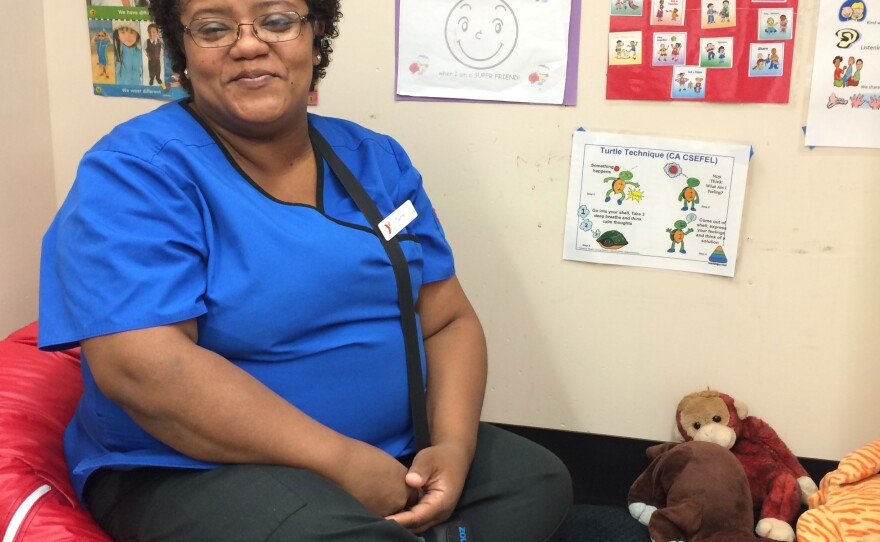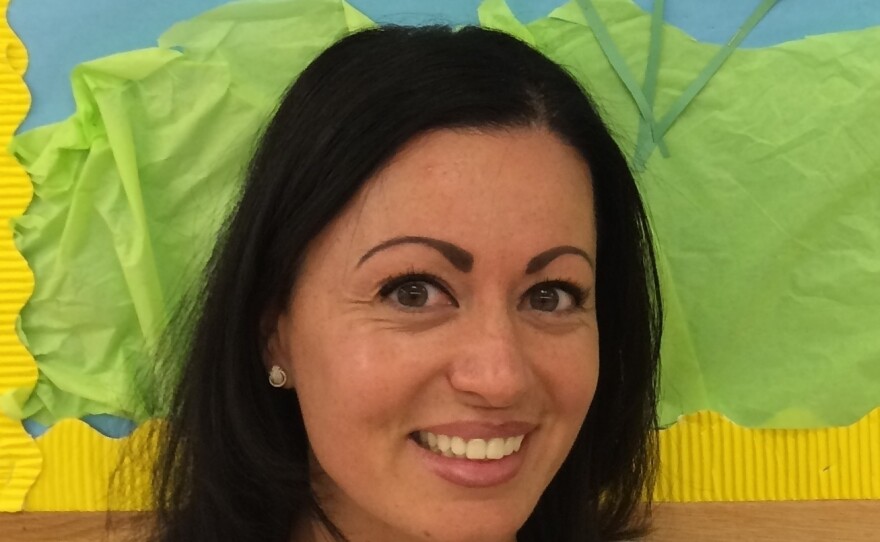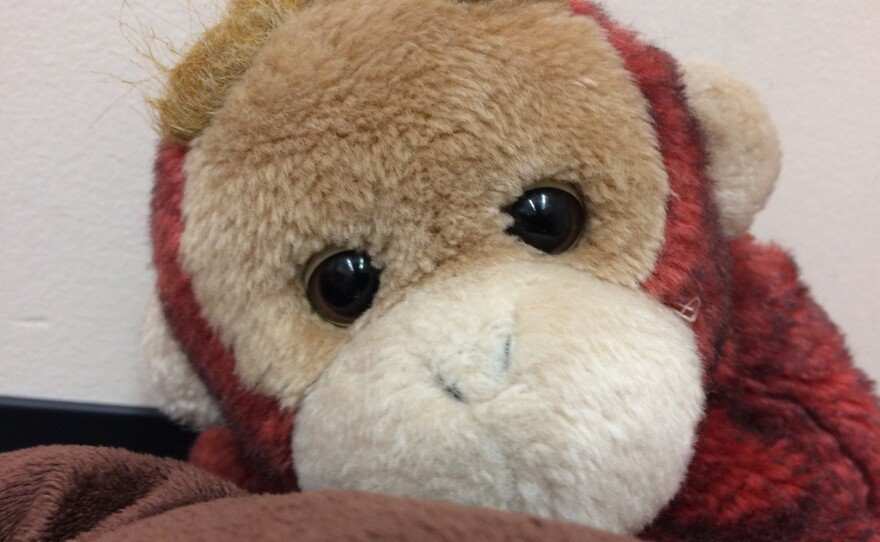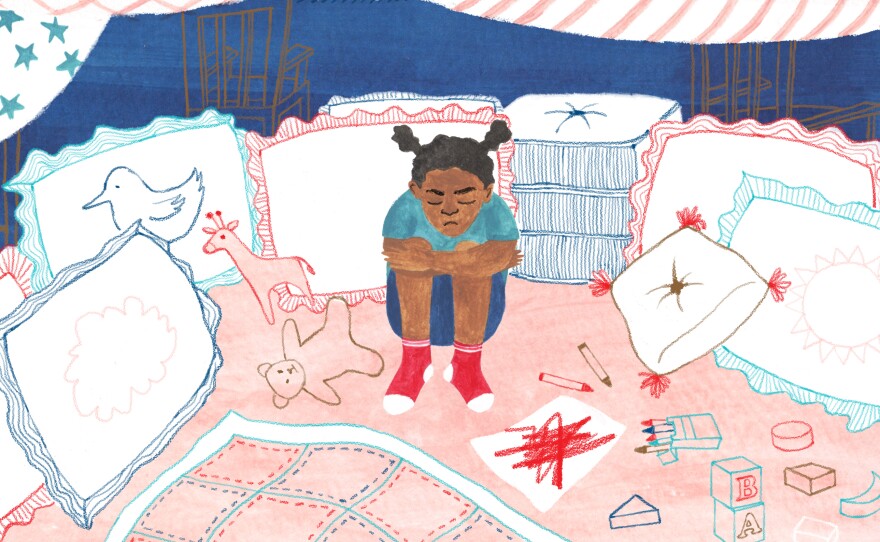


This story is part of a series from NPR Ed exploring the challenges U.S. schools face meeting students' mental health needs.
Every year, thousands of children are suspended from preschool.
Take a second to let that sink in.
According to the U.S. Department of Education, 6,743 children who were enrolled in district-provided pre-K in 2013-14 received one or more out-of-school suspensions.
And that's just public pre-K. Still more children were likely suspended from the nation's many privately-run preschools and day cares.
While most suspensions come as the result of a child's disruptive, sometimes violent, behavior, experts and advocates now argue that suspending a 3- or 4-year-old, no matter how bad the behavior, is a bad idea.
"Expelling preschoolers is not an intervention," according to a policy statement issued earlier this year by the National Association for the Education of Young Children and endorsed by the American Academy of Pediatrics. "Rather, it disrupts the learning process, pushing a child out the door of one early care and education program, only for him or her to be enrolled somewhere else, continuing a negative cycle of revolving doors that increases inequality and hides the child and family from access to meaningful supports."
But what to do?
Answer: Study Connecticut.
First, lawmakers there took a rare vote last year, limiting out-of-school suspensions for children from preschool through second grade.
More importantly, though, the state has spent more than a decade pioneering an intensive, classroom-level intervention — one that new research from Yale suggests is making a powerful difference in preschools across Connecticut.
The boy with the orange socks
Children bound from wall to wall through a small YMCA gymnasium in a low-income neighborhood of Bridgeport, Conn. While most play tag, one boy wearing bright orange socks heads straight for a crate in the corner. There, among the foam balls and cones, he finds a long, plastic rod.
The boy considers the stick in his hands, waving it like the lightsaber he imagines it to be, then heads for the nearest child. He swings.
Lead teacher Terrie Walker — Miss Terrie to the kids — steps in before the boy can land a blow. But how she intervenes is what separates her Bridgeport classroom from so many around the country.
In many preschools, "No," "Stop" and "Don't" get thrown around like glitter. Miss Terrie uses none of them. She knows that, to a 3-year-old, they could have the opposite effect, reinforcing a bad choice. Instead, she turns the boy's stick into a game — a bar — that he and soon everyone else wants to jump over.
"It's too high?" Miss Terrie asks the boy with orange socks. He nods, eager to take his turn. "OK, let's put it low."
The boy gives her a vigorous high-five, steps over the bar, and circles to the end of the line of kids hoping to do the same. There, he waits patiently for his next turn.
Problem solved. Suspension-worthy behavior bomb, defused.
"That's the perfect example of gentle redirection," says social worker Maria Santos, who's been watching and gently coaching Miss Terrie for weeks. Santos is thrilled with what she's seen. "You know, telling children what to do instead of what not to do. Because that's how they're going to learn better."
Santos is here as part of a program run out of Connecticut's Department of Children and Families called the Early Childhood Consultation Partnership or ECCP. It's meant to help any pre-K teacher or childcare provider in the state who's having trouble with a disruptive child. Before we get to how it works, it's important to say this: It appears to work.
The evidence
"The children who got the intervention had a significant decrease in the types of challenging behaviors that are likely to lead to a classroom expulsion or suspension," says Yale researcher Walter Gilliam.
Gilliam and his team have been studying the program off and on for a decade, and just published their latest findings — the results of a rigorous, random-controlled evaluation. While it's tough to know if ECCP has long-term benefits, the short-term results, as reported in the latest issue of the Journal of the American Academy of Child & Adolescent Psychiatry, are impressive.
According to Gilliam's report, "children who received ECCP had significantly lower ratings of hyperactivity, restlessness, externalizing behaviors, problem behaviors, and total problems compared with children in the control group even after controlling for gender and pretest scores."
That doesn't surprise Michelle Genest. She's assistant director of childcare at Miss Terrie's Bridgeport Y, and calls the program "phenomenal." Because so many kids there struggle with poverty, hunger and trauma, Genest says, managing disruptive behavior is a common challenge for her and her staff.
"We've had children attempt to run out of the building, throw furniture. We've had children severely injure other children," she says.
Still, Genest says, suspension never makes sense. And she sees ECCP as a vital investment in the mental health of Connecticut's most vulnerable kids.
"You have to start it now," Genest argues. "And if you pump all of your resources into making productive little people, they are going to grow up to be productive members of society."
Research suggests Genest is onto something. The longitudinal study of children who attended one high-quality pre-K program in Ypsilanti, Mich., has shown remarkable savings to society — in crimes not committed, welfare not collected and taxes paid. But a child can't benefit from high-quality preschool if he's been sent home.
That explains why funding for ECCP, roughly $2.4 million annually, comes not from the state's Department of Education but its child-protection agency, the Department of Children and Families.
"We believe it is critically important to get to children as early as we can to set the stage for future success," says Kristina Stevens, a top administrator at DCF. "For us, this is a no-brainer in child protection. The more we can do early on — in terms of prevention, early identification and early treatment — makes for better outcomes. And, quite frankly, we're kind of in the business of putting ourselves out of business. If we can get kids and families early on and they don't have to become the subject of a child protection investigation, that's a good day."
The program began in 2002 after the state legislature led an effort to pinpoint gaps in Connecticut's mental health services. One big red flag: the state's plan (or lack thereof) to prevent preschool suspensions and expulsions.
The nonprofit group Advanced Behavioral Health proposed the idea of ECCP to the state and eventually got the greenlight. The basic pitch: Create a team of well-trained, community-based consultants, most of them licensed social workers, who can parachute into classrooms before a child is suspended.
Also key to the program is a built-in evaluation system that assesses the classroom environment before and after an ECCP intervention.
The program began with a dozen consultants but, after early signs of success, state leaders chose to fund another dozen, making it easier for ECCP to cover every corner of the state. As a result, Stevens says, the program has "touched 82-percent of preschool centers in the state of Connecticut."
How it works
For three months, Maria Santos, who is one of those ECCP consultants, drops in and out of Miss Terrie's classroom to observe and offer pointers.
The boy with orange socks acts out when he's bored, so she suggests giving him a front seat at circle time. When he lashes out, it's not anger but frustration. He's 3 years old, and words don't come easily.
On this day, after free play, Santos sits with the boy and a little girl at the blocks table. When he snatches a toy, Santos encourages the girl to express herself.
"That hurt my feelings," the girl says, holding back tears.
Without scolding, Santos turns to the boy with orange socks and asks, "Can you help us come up with a solution to our problem? You both want to play with that wheel."
With Miss Terrie watching, Santos deftly gets the children building together — a bridge for their block city.
A big part of Santos' job is also building figurative bridges between teachers and parents. In this case, between Miss Terrie and the boy's grandmother. Many pre-K teachers and day care providers don't have the time to do this alone. They're certainly not paid to do it, often earning less than parking attendants and bellhops. And it's not just teachers who welcome the help.
"Caitlyn helped me view our daughter Ruby in a new lens," says Annie, a mother in Greenwich, Conn. She struggled to make sense of her 4-year-old's defiant behavior. With the help of ECCP consultant Caitlyn Dunn, Annie and her husband, Greg, had several breakthroughs with Ruby, including one bedtime conversation about the fact that their family would soon grow.
"She was very nervous about her baby brother coming," Greg says, "and she was afraid that we'd love baby brother more than we love her."
But, being 4, it was hard for Ruby to say that. Instead, she acted out.
"Behavior is the language of the child," says Liz Bicio, a licensed clinical social worker and director of ECCP.
And unruly behavior is usually a symptom of something else, Bicio says. Often it's a sign of stress at home, from Ruby's fear of impending change to potentially traumatizing stressors like neglect, abuse or exposure to neighborhood violence. Behavior can also be an early red flag for mental illness.
With her team, Bicio says she wants to help teachers and parents get past the symptom to the source. Otherwise, "it's kind of like saying, you have a major illness and part of it is a cough, and we're going to give you a cough drop."
Helping every child
ECCP isn't just focused on a classroom's most disruptive children. Bicio's consultants spend much of their time working classroom-wide, helping teachers build vital social-emotional skills for all students.
That can mean teaching the "turtle technique." If something frustrating happens, children are encouraged to "go into your shell, take three deep breaths, and think calm thoughts."
Teachers are also advised to create — or augment — something called a cozy corner. Miss Terrie has one. Five-year-old Madison points me to it: a nook in the back wall, lined with books and padded with pillows and stuffed animals.
"If you cry for your mom, then you can go in the cozy corner," Madison says. She remembers, "I didn't want to go to school one day. I was just laying down [in the cozy corner] because I was tired, and I went to sleep."
When she awoke, Madison says, she felt better and ready to rejoin the class.
Miss Terrie has also begun taking a few minutes out of each day, right before lunch, to lead the kids in structured meditation. The children seem to enjoy it, quietly breathing in and out with their teacher.
"Everybody should be relaxing," Miss Terrie says. "Think about somewhere you want to be right now. Somewhere good. You may want to be at the beach. You may want to be at the park. You may want to be with Mom or Dad. So let's relax. Let's think about that."
And they do, a rug full of buoyant preschoolers, becalmed.
ECCP, at its essence, is about helping children manage their big feelings and helping teachers and caregivers respond to outbursts, an inevitable fact of preschool life, with patience, understanding and respect — not with big feelings of their own.
Since the program began, it has reached more than 30,000 children, Bicio says. Of the many preschoolers it has helped directly, 98 percent were still suspension-free six months later.
That means more kids gathering on Miss Terrie's big, red rug to dance the Nae Nae and celebrate their graduation to kindergarten.
Copyright 2016 NPR. To see more, visit http://www.npr.org/.






